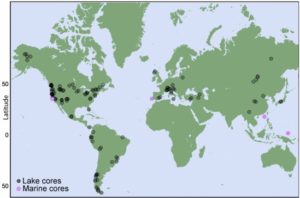Feb
09
2018
 Here we go again.
Here we go again.
If you are in a decision-making position at an institution of higher learning than you have a responsibility to understand and protect the academic reputation of that institution. Further, such institutions (many of which, as in this case, are publicly funded) have a responsibility to society, to promote academic standards and legitimacy. At the very least such institutions should not be promoting pseudoscience, or dressing up any nonsense as if it were real.
Georgian College in Ontario has approved funds and plans to open a program that will teach homeopathy as if it is real medicine. Teaching any pseudoscience is an outrage, but when it is medical pseudoscience there is also arguably another layer of malfeasance because the connection to real harm is more direct.
I know this is old territory here, but for review: Homeopathy is a prescientific philosophy-based system based on magical thinking. Its core ideas were never valid, and have never been supported by science. Essentially, homeopathy uses fanciful treatments that are based on silly ideas, such as the personality of the patient, but also “sympathetic magic.” The belief is that homeopathic remedies contain the magical essence of symptoms and can be used to cure those same symptoms.
Then, doubling down on the idea of magical essence, all actual substances are diluted out of existence, so that only the essence remains. Therefore, in reality, only water remains. Homeopathy is literally treating people with magic water created with rituals resembling witchcraft, and without the tiniest bit of scientific legitimacy.
Continue Reading »
Feb
08
2018
 Between 12,800 to 11,500 bp (before present) there was a cold period in North America called the Younger Dryas – named after the dryas flower whose pollen is a good marker for such cold periods. During this time the megafauna of North America, including the Mammoth, largely died out. Along with them went the Clovis culture – a big game hunting culture with distinctive stone points.
Between 12,800 to 11,500 bp (before present) there was a cold period in North America called the Younger Dryas – named after the dryas flower whose pollen is a good marker for such cold periods. During this time the megafauna of North America, including the Mammoth, largely died out. Along with them went the Clovis culture – a big game hunting culture with distinctive stone points.
What caused this period of climate change and mass extinction?
This is a genuine scientific controversy. One group of scientists believe that the melting glaciers dumped fresh water into the northern Atlantic, temporarily shutting down the ocean currents that bring warm water to North America. Another group think that a comet impact is to blame.
Continue Reading »
Feb
06
2018
 A recent systematic review and meta-analysis of the effects of mindfulness meditation on prosocial behavior found, essentially, that there is no evidence that it works. I find these results entirely unsurprising, and they yet again highlight the need for rigorous research before concluding that a phenomenon is real.
A recent systematic review and meta-analysis of the effects of mindfulness meditation on prosocial behavior found, essentially, that there is no evidence that it works. I find these results entirely unsurprising, and they yet again highlight the need for rigorous research before concluding that a phenomenon is real.
As I discussed recently on SBM, mindfulness meditation is the practice of sitting quietly, focusing inward and on the present, and avoiding mind wandering or daydreaming. The recent review I discussed on SBM found that the research into mindfulness, however, does not use a uniform or operationalized definition. That is critical to good science – you need to carefully define something before you can do research on it.
It is especially important to specifically define a concept in order to do research into the question of whether or not the phenomenon is real. If your question is, “Does X exist,” you better have a very specific definition of what X is. Otherwise it is easy to misinterpret the evidence, or to wiggle out of evidence that X does not exist.
The best example of this in medicine is acupuncture. Acupuncture is defined as sticking thin needles into acupuncture points – except when research shows that it does not matter where or even if you stick the needles, then acupuncture can be something else, which is vaguely defined.
Continue Reading »
Feb
05
2018
 On the Canadian Entrepreneur show, Dragon’s Den, the dragons were given a demonstration of a clip (that’s right, a small metal clip like you would use to hold papers together or put in your hair) that the creator claimed would improve your balance, strength, and health through the power of “quantum entanglement.” The clips, called Neuro Connect, were “developed” by a chiropractor and his partner. The Dragons fell for it, amazed by the demonstrations, and invested $100,000 for a 30% share.
On the Canadian Entrepreneur show, Dragon’s Den, the dragons were given a demonstration of a clip (that’s right, a small metal clip like you would use to hold papers together or put in your hair) that the creator claimed would improve your balance, strength, and health through the power of “quantum entanglement.” The clips, called Neuro Connect, were “developed” by a chiropractor and his partner. The Dragons fell for it, amazed by the demonstrations, and invested $100,000 for a 30% share.
The show aired, giving a huge boost to the company’s sales. However, the way the show works, even when the Dragons make a deal on camera, the deal is contingent on them doing due diligence for confirmation. When they did they found that there were serious scientific objections to the claims being made by company selling the clips, NeuroReset Inc. The deal was off.
But this did not stop the show from airing. The public did not get the benefit of their due diligence – they protected themselves, but completely threw their audience under the snake oil bus. Canadian news outlet CBC contacted the producer to get their response:
Continue Reading »
Feb
02
2018
 Hopefully it’s not news to you that the Earth is warming due to human release of carbon dioxide and other greenhouse gases. A number of studies have assessed the scientific consensus on anthropogenic global warming (AGW), with results clustering around 97%. Overwhelmingly, most climate scientists have looked at the data and concluded that AGW is happening.
Hopefully it’s not news to you that the Earth is warming due to human release of carbon dioxide and other greenhouse gases. A number of studies have assessed the scientific consensus on anthropogenic global warming (AGW), with results clustering around 97%. Overwhelmingly, most climate scientists have looked at the data and concluded that AGW is happening.
Climate scientists have gone beyond just establishing that AGW is happening. They are trying to quantify it and project the trend lines into the future. This type of effort is always fraught with uncertainty, with the error bars increasing with greater time into the future. However, we can take a 95% confidence interval and make reasonable extrapolations of what is likely to happen.
Recognizing this uncertainty, the Intergovernmental Panel on Climate Change (IPCC) has concluded that we should keep post-industrial warming to less than two degrees Celcius if we want to avoid serious effects of climate change. Given that as the goal, they can then determine how much more carbon would need to be released to cause this amount of warming. This can be used to determine how much we need to decrease future carbon emissions.
Continue Reading »
Feb
01
2018
 The New Yorker magazine’s latest issue features an article about the sad story of Jahi McMath. Jahi was a 13 year old girl who four years ago underwent a routine tonsillectomy to treat severe snoring and breathing problems. Unfortunately the surgery was complicated by severe bleeding post-op, leading eventually to a cardiac arrest. After a sustained effort at resuscitation the doctors did manage to get her heart working, but by that time her brain was severely damaged by lack of oxygen. She was declared clinically brain dead.
The New Yorker magazine’s latest issue features an article about the sad story of Jahi McMath. Jahi was a 13 year old girl who four years ago underwent a routine tonsillectomy to treat severe snoring and breathing problems. Unfortunately the surgery was complicated by severe bleeding post-op, leading eventually to a cardiac arrest. After a sustained effort at resuscitation the doctors did manage to get her heart working, but by that time her brain was severely damaged by lack of oxygen. She was declared clinically brain dead.
This is not where the story ends, however. Since then the family has refused to accept the diagnosis of brain death, prompting a prolonged conflict with the hospital. Eventually Jahi was removed by the family to an undisclosed hospital in New Jersey, and ultimately discharged to home care, where she remains.
I have had several questions about the story, and I will try to add some insight, with the caveat that I have no direct knowledge of the medical facts of the case beyond what is reported in the New Yorker article and elsewhere. I have not examined her, spoken directly to anyone involved in her care, or reviewed medical records. But there is a lot of information in the public domain and I can speak to that information, as far as it is accurate.
There are several layers to this story. There is a legal layer, as the family is suing the hospital for malpractice. I will not address that aspect of the case. There is the neurological layer – what is brain death and is this girl dead? There is also a personal and cultural layer here in terms of the family’s reaction. Let me start with some thoughts on this.
Continue Reading »
 Here we go again.
Here we go again.
 Between 12,800 to 11,500 bp (before present) there was a cold period in North America called
Between 12,800 to 11,500 bp (before present) there was a cold period in North America called  A recent systematic review and meta-analysis
A recent systematic review and meta-analysis On the Canadian Entrepreneur show, Dragon’s Den, the dragons were given a demonstration of a clip (that’s right, a small metal clip like you would use to hold papers together or put in your hair) that the creator claimed would improve your balance, strength, and health through the power of “quantum entanglement.” The clips, called Neuro Connect, were “developed” by a chiropractor and his partner. The Dragons fell for it, amazed by the demonstrations, and invested $100,000 for a 30% share.
On the Canadian Entrepreneur show, Dragon’s Den, the dragons were given a demonstration of a clip (that’s right, a small metal clip like you would use to hold papers together or put in your hair) that the creator claimed would improve your balance, strength, and health through the power of “quantum entanglement.” The clips, called Neuro Connect, were “developed” by a chiropractor and his partner. The Dragons fell for it, amazed by the demonstrations, and invested $100,000 for a 30% share. Hopefully it’s not news to you that the Earth is warming due to human release of carbon dioxide and other greenhouse gases. A number of studies have assessed the scientific consensus on anthropogenic global warming (AGW),
Hopefully it’s not news to you that the Earth is warming due to human release of carbon dioxide and other greenhouse gases. A number of studies have assessed the scientific consensus on anthropogenic global warming (AGW),  The New Yorker magazine’s latest issue features
The New Yorker magazine’s latest issue features 




